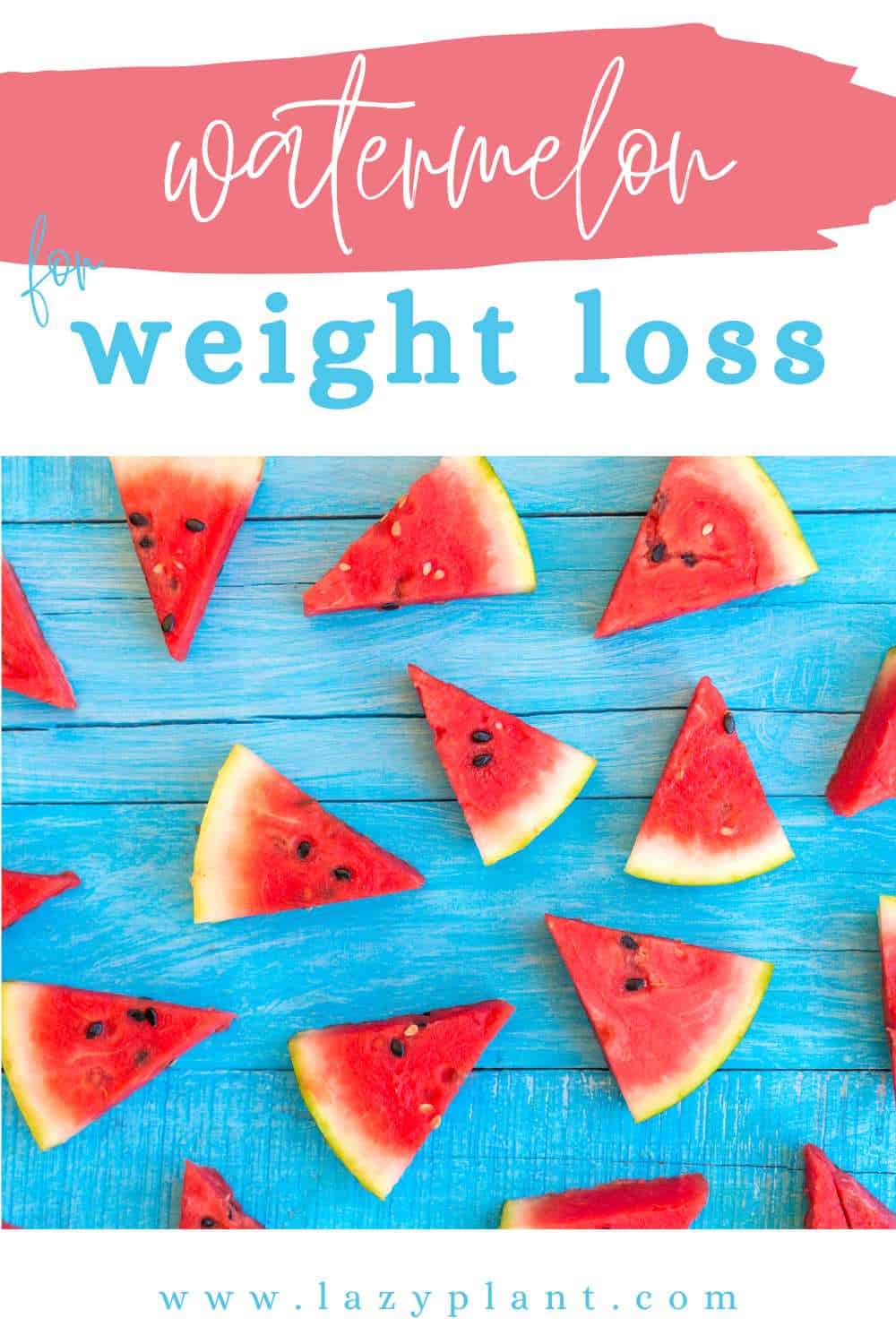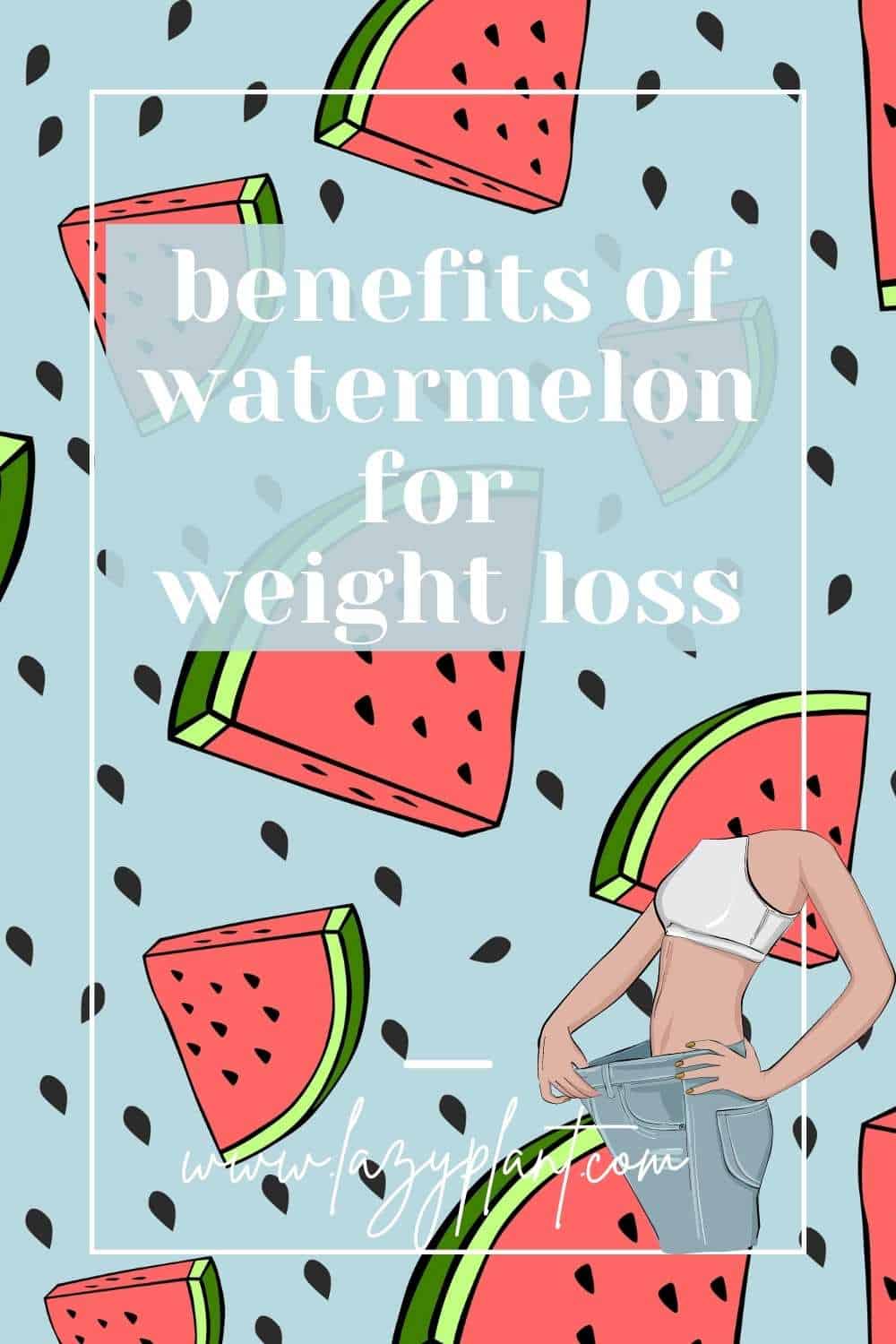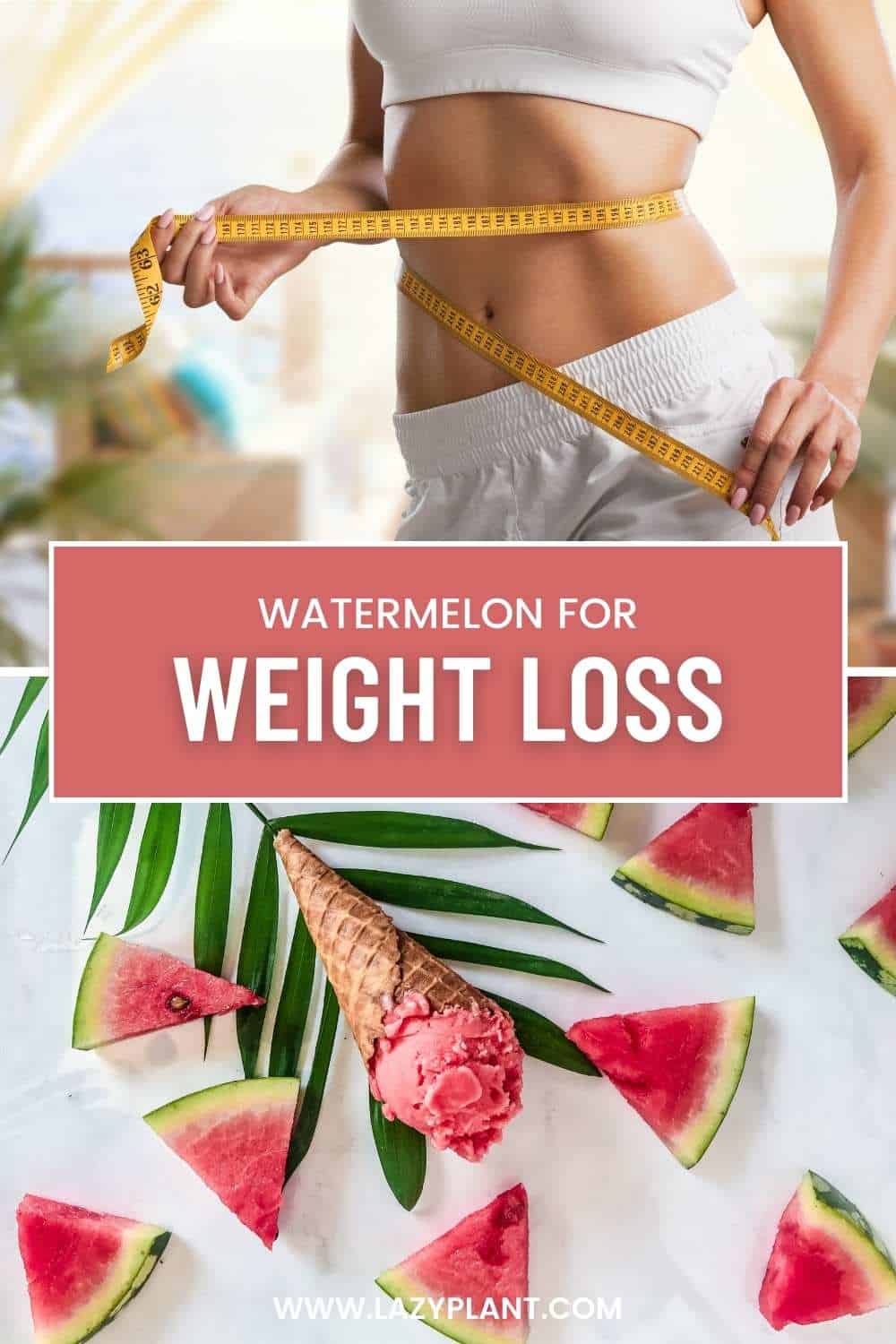Eating watermelon is actually good for weight loss, as it reduces appetite and helps the body burn more fat. A cup of watermelon has only 45 calories. Also, it’s low in sugar.
Benefits of Watermelon for Weight Loss
Watermelon has a few calories
Above all, watermelon is good for weight loss because it has a few calories. Watermelon has 30 calories per 100g. A serving has only 45 calories.[1]
A 1-inch thick wedge of sliced watermelon has about 90 calories. It’s equivalent to two servings.

A cup has about 11 grams of carbs and 1 gram of protein.
Sugar
Watermelon is mainly sugars. It has 6.2 grams of sugar per 100g or 9.2 grams per cup.
Watermelon has 3 types of sugar: fructose, glucose, and sucrose:
- fructose is 54% of the total sugar content of watermelon
- glucose is 26%
- sucrose in 20%
Fructose has to be metabolized by the liver first. In contrast, glucose is instantly available to the body. Thus, watermelon won’t spike blood sugar levels. It has a low Glycemic Index of 48.[2]
Even people with diabetes could safely consume a serving of watermelon in order to satisfy their sweet tooth. In fact, the American Diabetes Association has listed watermelon as a safe fruit for people with diabetes. It’s a healthy dessert.[3]
Keep in mind that commercial watermelon juices, drinks, or cocktails may contain high amounts of added sugars. For instance, an 8 fl oz glass of commercial watermelon juice may contain 20 grams of extra added sugars. You better avoid them.
In fact, most popular fruits contain significantly more sugar than watermelon! Only berries, lemon, and avocado have significantly less sugar than watermelon.
| sugar (grams per 100g) | |
| dates | 66 |
| raisins | 65 |
| mango | 13.7 |
| apple | 13 |
| banana | 12.2 |
| pear | 9.7 |
| orange | 9.2 |
| kiwi | 9 |
| melon | 9 |
| papaya | 7.8 |
| watermelon | 6.2 |
| cranberries | 4.3 |
| lemon | 2.5 |
| avocado | 0.3 |
Fiber
Watermelon has only 0.4 grams of fiber per 100g. A cup of watermelon contains 0.6 grams of fiber or 2% of the Daily Value.
You could also eat watermelon seeds. They’re 100% edible. Moreover, watermelon seeds control postprandial glucose responses due to their high fiber content. Also, they’re packed with minerals and healthy fats. Watermelon seeds contain no sugar.
Watermelon helps you lose weight as it hydrates you
A cup of watermelon hydrates the body. It provides 140 mL of water! Watermelon is 92% water.
We should drink adequate amounts of water if we want to lose weight. Actually, water fills the stomach, reducing hunger.
Most noteworthy, water is crucial for lipolysis. In other words, water is necessary for the body to burn fat for energy![4]
We should drink at least 64 oz of water a day while dieting
Furthermore, watermelon hydrates us better than tap water, as it’s rich in electrolytes. Replenishing electrolytes is key for weight loss and good health. Electrolytes are involved in many key functions of the body. A slice of watermelon contains:
- potassium 320 mg
- magnesium 29 mg
- sodium 3 mg
- calcium 20 mg

Last, but not least, watermelon provides high-quality, purified water. Fruits are natural water filters.
It’s important to consume lots of summer fruits and vegetables high in water, such as tomatoes and cucumbers!
A whole watermelon has more than 4 liters of water!
Lycopene in watermelon supports weight loss!
Watermelon can help you lose weight for another reason. It’s particularly rich in lycopene.
Lycopene is an antioxidant that can help us burn body fat. High lycopene intake has been associated with reduced waist circumference.
Also, it neutralizes obesity-associated disorders and regulates cholesterol levels.[5,6]
A cup of watermelon has 6.9 mg of lycopene. There hasn’t been established a recommended daily intake for lycopene. However, most studies have reported great health benefits from a daily intake of 15-30 mg of lycopene.
In 2005, the average daily intake of lycopene in the United States was between 5.7 and 10.5 mg.[7]

You can skyrocket your daily lycopene intake by consuming watermelon. It’s one of the richest foods in lycopene.
The main dietary sources of lycopene are tomato products, though.
Potassium
Watermelon is a great dietary source of potassium. It contains 112 mg of potassium per 100g. It contributes to the daily potassium intake. A cup of watermelon contains 170 mg of potassium. This dose is 5% of the recommended daily intake.
Potassium, along with sodium, chloride, magnesium, and calcium are important minerals, known as electrolytes.
Potassium is an essential nutrient. It’s present in all body tissues. Adequate amounts of potassium may lower high blood pressure, and decrease the risk of cardiovascular disease and stroke.[8,9]
Also, potassium may prevent osteoporosis, as it regulates calcium metabolism. Furthermore, potassium is crucial for glucose metabolism and preventing diabetes.
Avocados and bananas are the two richest fruits in potassium. They have between 3 and 5 times more potassium than watermelon.
| potassium (mg per 100g) | |
| avocado | 507 |
| banana | 358 |
| cantaloupe | 267 |
| cherries | 222 |
| grapes | 218 |
| kiwi | 198 |
| orange | 169 |
| mango | 168 |
| plums | 157 |
| lemon | 138 |
| pineapple | 137 |
| grapefruit | 127 |
| watermelon | 112 |
| pear | 104 |
| apple | 100 |
| cranberries | 80 |
When should I eat watermelon for weight loss?
The best time to eat watermelon for weight loss is before a calorie-dense meal. Water and fiber in watermelon regulate appetite with only a few calories. Thus, it can control total energy intake!
Furthermore, you could eat watermelon whenever have cravings for sugar.
Also, we could eat watermelon after exercise, as it hydrates the body. Watermelon provides high-quality water as well as electrolytes, which are important for muscle function and recovery.
At Breakfast
Consuming watermelon at breakfast is good for hydration.
Moreover, consuming fruits high in sugar at breakfast is good for you. It provides energy for hours. It’s a better option than many bakery products!
You should combine watermelon with other foods containing protein and fiber like oatmeal, seeds, nuts, protein powder, and whole-grain bread. Meals rich in water, protein and fiber tend to have the highest filling effect.
Most noteworthy, watermelon is pretty high in antioxidants like lycopene and vitamin C. Antioxidants neutralize free radicals, which are a common cause of many diseases. It’s better to boost the antioxidant status of the body first thing in the morning. They protect us from sun radiation, air pollution, smoking etc.
What’s the worst time of the day to eat watermelon?
However, eating watermelon before bed is bad for weight loss. First, we should have dinner at least 2 hours before bedtime. Eating late at night causes belly fat.
Moreover, eating watermelon before bed is bad for weight loss because it makes you pee. It disrupts sleep, as it’s a natural diuretic. A good night’s sleep is crucial for maintaining a normal body weight. Not sleeping well at night has been associated with obesity.
Waking up at night may interfere with the production of night hormones, such as melatonin or testosterone. Furthermore, less sleep may cause increased hunger and appetite the next day![10]
Can watermelon make you fat?
The main type of sugar in watermelon is fructose. Fructose doesn’t spike blood sugar levels as compared to glucose. It has to be metabolized by the liver first. Moreover, watermelon is mainly water.
For these reasons, watermelon has a pretty low glycemic load of 7! Foods with a glycemic load lower than 10 are actually beneficial for weight loss. Among other benefits, they reduce hunger.[11]
Is watermelon Keto-friendly?
Consider, eating only 1/2 cup of watermelon if you follow a ketogenic diet while trying to lose weight. Most ketogenic diets limit net carbs to 50 grams a day. A half cup of watermelon has only 6 grams of carbs.
Watermelon may reduce high blood pressure
Additionally, we should maintain a healthy body weight in order to prevent hypertension. Overweight and obese people have a higher risk of high blood pressure. Sedentary life, smoking, alcohol abuse, caffeine overconsumption, and low-quality sleep are also key risk factors for hypertension.[12]
Also, we should reduce the consumption of sodium (salt) and saturated fat. Animal products are the main sources of saturated fat. Hence, we should limit their consumption to the minimum.
More than 1 in 3 adults in the U.S. has high blood pressure! Most noteworthy, many of those people don’t know it. They haven’t experienced any warning signs or adverse effects. This can be pretty dangerous. High blood pressure can lead to life-threatening conditions like heart attack or stroke![13]
According to studies, watermelon has beneficial effects on hypertension. Regular consumption of watermelon, as part of a healthy, well-balanced diet, may help reduce both systolic and diastolic blood pressure in prehypertensive and hypertensive people.[14,15]
Obesity is a major risk factor for hypertension. Estimates suggest 65-78% of cases of primary (essential) hypertension can be attributed to excess weight gain.
L-arginine
Watermelon is particularly rich in L-Citrulline. This amino acid is converted into L-arginine in the body. Also, L-Citrulline increases L-arginine’s bioavailability. L-arginine is an amino acid as well. L-arginine may reduce high blood pressure, as it seems to improve vascular function and endothelial nitric oxide synthesis.
Actually, among the richest foods in L-arginine are watermelon seeds. Not only, are watermelon seeds edible, but also they have a superior nutritional value!
Nitric oxide
Moreover, impaired synthesis of nitric oxide increases the risk of hypertension and atherosclerosis. Enhancing the release of nitric oxide from the endothelium may reverse endothelial dysfunction![16]
Common foods naturally high in nitric oxide are arugula, turnip greens, radishes, endive, celery, Bok choy, cabbage, mustard greens, lettuce, and spinach.
Beetroot is the richest food in nitric oxide, though! If you want to boost your daily intake of nitric oxide, you could add a tsp of beetroot powder to recipes or smoothies.
You’ll find a wide variety of organic beetroot powders on Amazon!
Moreover, watermelon consumption may reduce arterial stiffness and aortic systolic blood pressure! Watermelon is good for the heart.[17,18]
Potassium & fiber
According to the CDC, we should consume a wide variety of fruits and vegetables to prevent high blood pressure. We should consume foods high in fiber and potassium as well.[19]
Watermelon is among the richest fruits in potassium and contains decent amounts of fiber!
Always consult your physician before changing your diet.